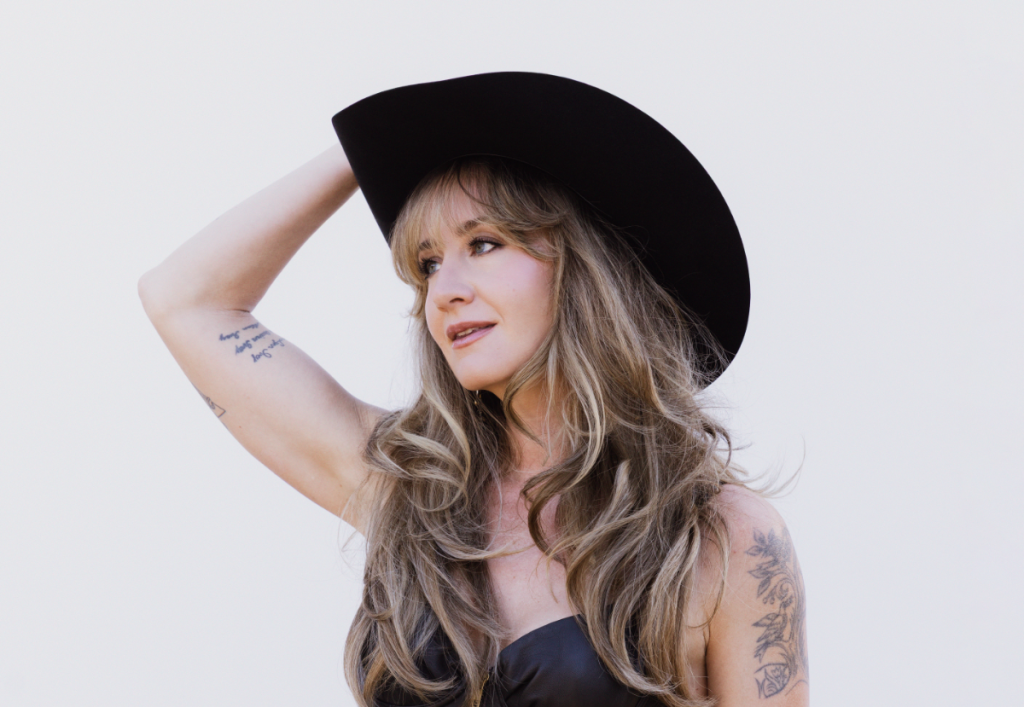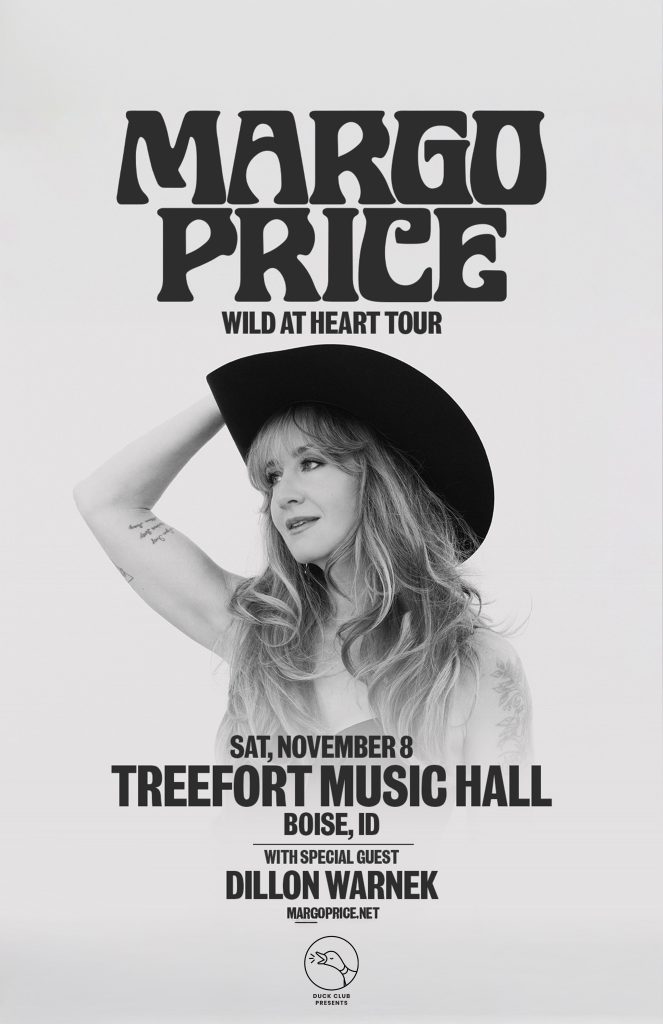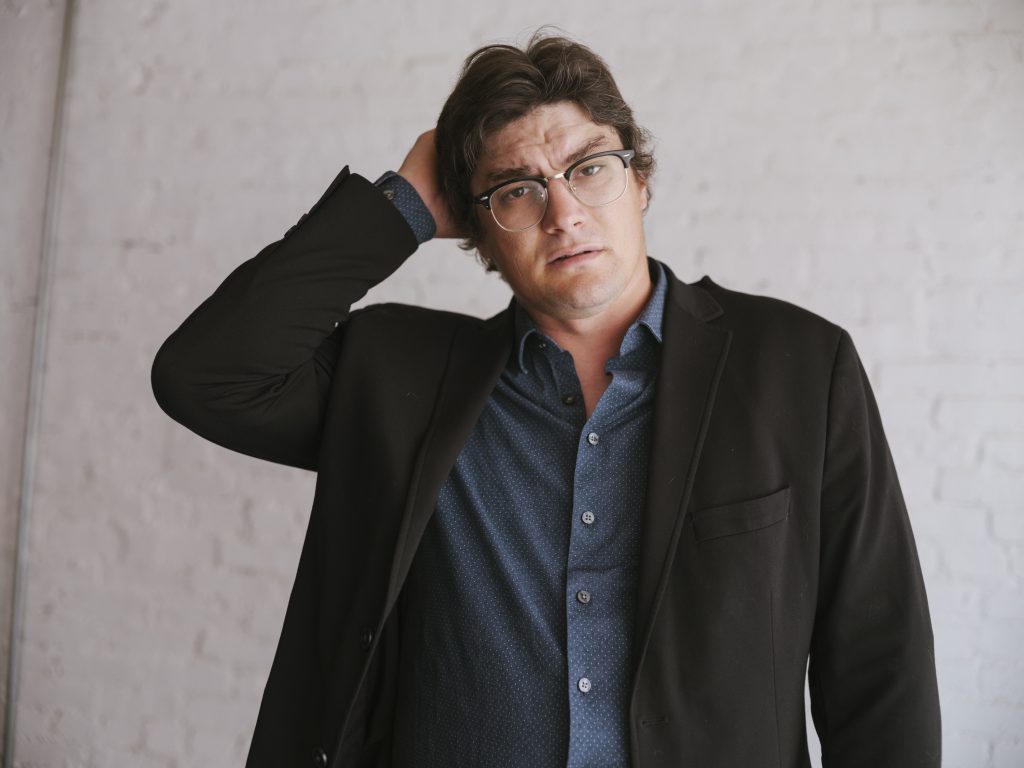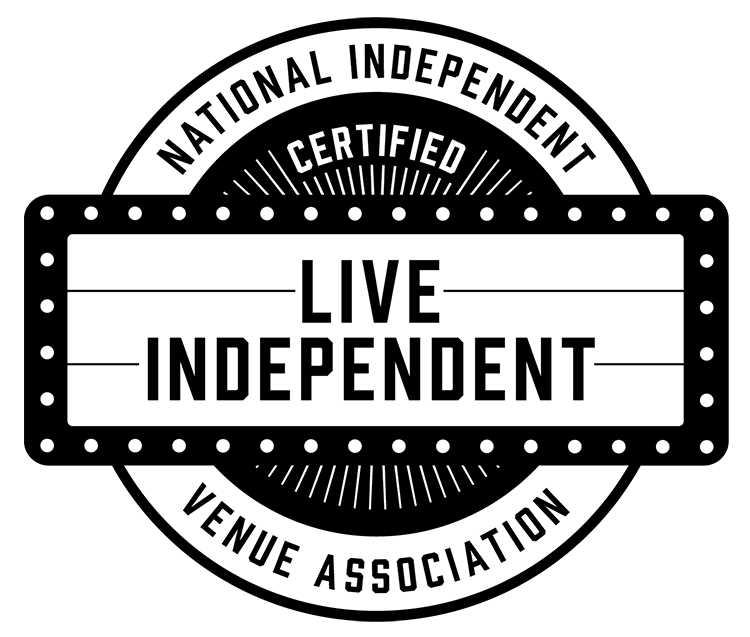Margo Price
Saturday, November 8th, 2025



Nearly a decade ago, Margo Price turned Nashville on its head with her breakthrough,
beloved debut solo album, Midwest Farmer’s Daughter. Released in the throes of bro-country and
before pop stars were crossing over into the genre left and right, it showcased an artist completely
unafraid to double down not only on herself, but what she’d always loved: classic country songs
written from the intellect and the gut, hell-bent on truth-telling and both timeless and urgent all at
once. Respected by her peers, praised by critics and beloved by her fans, Price created a lane where
independent-minded, insurgent country music can exist and thrive alongside the mainstream, and
became an ardent fighter for her beliefs in a genre where the norm is to shut up and sing. A
trailblazer and a champion for the craft, Price redefined what it meant to be a modern country
artist.
And now she’s back with an exquisite, truly timeless album that reconnects with her roots
and pays tribute to the art of the country song, inspired in part by the legends whom she now calls
colleagues and friends. Hard Headed Woman is both a look forward and a look back: a way to
march forward while staying true to yourself when the path of less resistance is right there in front
of us, and short cuts are around every corner. And a way to look back when we need to trim what
is no longer working, and to stay connected with where we’re from. It is a promise and a manifesto,
a love song to both a city and a genre, and a defiant cry for individuality.
In creating Hard Headed Woman, Price brought all of her power as one of our most
beloved and respected songwriters to craft a deep exploration of love and America in a time of
unprecedented uncertainty. Featuring appearances from Tyler Childers, co-writes with Rodney
Crowell and a Waylon Jennings song that his widow, Jessi Colter, urged her to sing, it is country
music as only Price can make it: free of rules, cherishing tradition, hard headed to the core but
with a delicate, beating heart.
Since releasing Midwest Farmer’s Daughter, Price has barely slowed down. She’s made
four records, played Saturday Night Live, been nominated for a Grammy, toured the world
alongside artists like Chris Stapleton and Willie Nelson, released a lauded memoir (Maybe We’ll
Make It, due on paperback September 2nd), became an in-demand producer and was appointed as
the first female board member of Nelson’s Farm Aid. And she’s been fearless when it came to
genre, venturing into psychedelic rock on her most recent, Jonathan Wilson-produced record,
Strays. It would have been easiest to just stay that course, and keep running. But Price doesn’t
follow success or comfort. She follows the art.
It took a whole lot of hard work and honesty with herself and others to get there, but that’s
never stopped Price before. “I made the decision that I had to rebuild everything from the ground
up,” Price says. “There’s all this pressure to be pumping out content, and I felt the opposite in the
way I wanted to approach this record and my life in general.”
Price had also established herself as one of the most passionate, vocal artists in country
music and beyond when it came to standing up for political and personal causes, from the
presidential election, to abortion to gun control: happily hard headed when it came to the fight for
equality and justice, especially for the working class and underserved in our society. Price has
always brilliantly woven her activism into her songs, but her role as a spokesperson had started to
overtake, on occasion, her role as a songwriter. She wanted to focus on using her written word to
deliver the most potent punch of all.
“I always hope to do like Johnny Cash did,” Price says, “which is speak up for the common
man and woman. But there have been so many threats and anger and vitriol over the years, when
I am only coming from a place of love.”
Price realized she just needed a break from everything outside of the bubble of family life
and her art. She started spending more time at home, writing songs alone and with her husband,
Jeremey Ivey. She started popping up in the dive bars and tiny venues around Nashville where she
got her start, sometimes just to play a country cover or two or dance with the crowd. She refused
guidance to write for pop stars or compromise her values for a quick buck. Most of all, she turned
the emphasis in her music back to songwriting, exactly where she began.
“So much of Strays was leaning into this psychedelic, textural territory,” says Price. The
music lent itself to vibrant, heavy stage jams, with Price often hopping behind the drumkit and
bruising her thigh from a tambourine beat. She found herself longing for the days when it was just
her and her guitar, playing at an East Nashville dive bar. “I always knew,” she adds, “I would come
back to this more rooted sound.”
Hard Headed Woman is rooted to its core. Rooted in Price’s history and struggle to make
it as a musician for so many years in a town that prizes uniformity and the bottom line, rooted in
the country and folk sounds that have become her signature, rooted in the simplicity of a few key
collaborators instead of songs-by-committee. At the heart of Price’s work is her creative
partnership with Ivey, with whom she describes as having a “soul connection.” “I’m a songwriter,”
Price says. “I’m not somebody who goes out and needs five people to craft a song, and then tack
my name on it. That’s never been my style. I have something to say.”
Something to say, nothing to prove. The first song they wrote for the album that would
become Hard Headed Woman was “Close to You,” a simple, pining call for a lover that is infused
with the sounds of the desert. It’s unfettered and truth-telling, accented by some flamenco guitar
and Price’s gorgeous, urgent vocals. “We played the jukebox while democracy fell,” Price sings,
never letting her songs fall out of the context in which they exist. It’s the kind of thing that only
she could write, carrying both love and fear in one single line.
As more songs started to form, an early boost of confidence came from her friends Rodney
Crowell and Emmylou Harris, who heard some of the work at a political fundraiser and encouraged
Price to keep going. “I have both of them to thank for building me up and making me believe in
the songs I am writing in this season of my life,” Price says. Crowell remained not only an
inspiration and supporter of the album but a contributor: he co-wrote two songs with Price and
Ivey.
The album that unfolded from there is drenched in Price’s unique story and unshakeable
instincts: while Midwest Farmer’s Daughter was about her journey from childhood to Nashville,
Hard Headed Woman is very much her battle since from dive bars to tour buses, through
parenthood and marriage, through scrutiny and sacrifice all while fighting constantly for what she
believes in, and the music she loves. It begins with a proclamation on the prelude, which serves as
the album’s mission statement: or, Price puts it, “a disclaimer and reminder that I don’t owe you
fucking shit.”
Songs like the album’s lead single, “Don’t Let the Bastards Get you Down,” speak for the
downtrodden and the forgotten, an “anthem for people who are being overlooked in society and
need to be lifted up,” Price says, “because we are up against so much right now.” As so many of
Price’s songs do, it speaks both for the personal and the political all at once. Price was inspired by
the message Kris Kristofferson whispered to Sinead O’Connor when she was booed on stage at a
Bob Dylan 30th Anniversary show, and even got Kristofferson’s widow’s blessing to include his
name on the credits. “I always admired Kris for how he stood by her in that moment, instead of
pulling her off the stage like they told him,” Price says. It serves as a reminder to anyone who
encounters resistance in the face of fighting for justice to keep going, especially when it would be
so much easier to capitulate and cower.
“The song was originally written for a movie that never happened, but it feels so timely
with everything that’s going on in the world,” Price explains. “The phrase, ‘Don’t Let The Bastards
Get You Down’ originates from Margaret Atwood’s brilliant 1985 piece of literature, The
Handmaid’s Tale. It’s referred to in Latin and used as a rallying cry for resistance against the
oppressive regime that symbolizes resilience and hope in the face of adversity. Nolite te Bastardes
Caborundorum.”
That spirit resonates all across the songs of Hard Headed Woman. The blistering “Don’t
Wake Me Up” was based around some writings that Ivey stumbled upon in one of Price’s
notebooks, inspired in part by her deep readings of Frank Stanford, one of her favorite poets due
to his freewheeling work free of boundaries. They spun it all into song in minutes that chugs with
the essence of Dylan’s “Subterranean Homesick Blues”: “The way this world is going, ain’t where
I’m at,” Price howls in her powerful, unmistakable voice. “Nowhere is Where,” turns slow and
contemplative, road-worn but never broken, the call of someone who has been to the mountain but
never forgets the prairie below. And “Losing Streak” whirls in with an organ and out with a weary,
world-worn defiance: our worst times don’t define us, but they’re always part of who we are.
There are songs that go back to the beginning of Price’s early grind, like the western-tinged
“Wild at Heart,” reflecting on how much her life and the city of Nashville has changed over the
years – and how important it is to stay true to exactly who you are despite it all. Another, called
“Red Eye Flight,” is about both leaving a lover and also leaving her longtime band the Pricetags.
“I’ve been with those players for ten, thirteen years,” she says. “But I could feel that I needed to
make a change, and to change texturally what’s going on with the band. But it’s a familial bond,
different than a friendship.”
There are a few choice covers and cuts, too: “Love Me Like You Used To Do” is by Price’s
friend Steven Knudson, an unsung Nashville writer on whom she hopes to shine a spotlight
(helping to elevate the town’s incredibly talented but buried voices is one of Price’s favorite
pastimes). Friend Tyler Childers joins Price on that waltzing country ballad, while “I Just Don’t
Give a Damn” is Price’s “Jolene goes to Memphis” take on the Jimmy Peppers and George Jones
classic. And showcasing how Price has been trusted by the greats to lead the next generation of
country music renegades, “Kissin You Goodbye” was given to Price by Jessi Colter, Waylon
Jennings’ widow, when Price was producing her record. They’re songs chosen to appreciate the
past and the present as she sees it – not as Music Row or the algorithm might dictate – and place
Price squarely amongst her heroes as a living and breathing part of the new country tradition.
When it came time to record Hard Headed Woman, it was important for Price to keep that
ethos alive, decamping to Nashville’s RCA Studio A and reuniting with producer Matt Ross-
Spang, with whom she made her first two solo albums. Though she has worked with everyone
from Sturgill Simpson to Jonathan Wilson since, it was Spang’s vocal rebuke of easy studio
shortcuts that made her eager to reunite again. “He’s so unpretentious,” Price says. “He fully
believes in me, he fully believes in my songs. He got us back to feeling it in your gut and not
needing everything to be so perfect.”
It felt truly significant for Price to make the album in Nashville, a city where she’s lived
for over two decades and played a seminal role in its transformation, yet somehow never recorded
an album in the place she’s called home. The historic RCA Studio A helped connect Price even
closer to the legacy of songwriting she holds so dear, a place where everyone from Dolly Parton
to John Prine to Loretta Lynn have made albums. “It felt like there were ghosts and spirits just
hanging out,” Price says. In perfect kismet, she also launched her own signature Gibson J-45 guitar,
inspired by her 1960’s Gibson she’s had by her side for years as her career took off. It’s all part of
the continuity that she wishes to create with her art, not just with timeless songs but inspiring future
generations of women, mothers and artists in general who don’t want to sacrifice their vision,
moral compass or family life in favor of mainstream success.
At its core, Hard Headed Woman is about that furious instinct to never waver, especially
when ourselves, our values and our future is so clearly on the line. As she sings on the title track,
“I ain’t ashamed, I just am what I am.”
“I hope this album inspires people to be fearless and take chances and just be unabashedly
themselves,” Price says, “in a culture that tries as hard as it can to beat us into all being the same.”

Dillon Warnek
With the seal of approval of Nashville’s coolest couple Margo Price and Jeremy Ivey,
Dillon Warnek has emerged as one of Music City’s most skillful new songwriters, writing
with all the verve and attitude of Warren Zevon. Rolling Stone raved that his debut
album Now That It’s All Over was full of “wry character studies about con artists and
dead men.” That’s true: Warnek — a construction worker by day, piano balladeer at
night — revels in such tales. He immerses himself in reckless evenings of spending
other people’s money, in hazy mornings waking up in a strange woman’s trailer, and in
fantasies about keeling over with far too many secrets to reveal. Onstage, Warnek holds
court at his keyboard, mixing wry anecdotes in with his subversive lyricism. Some say
there are no good piano men like Randy Newman anymore. But they just haven’t seen
Dillon Warnek.







